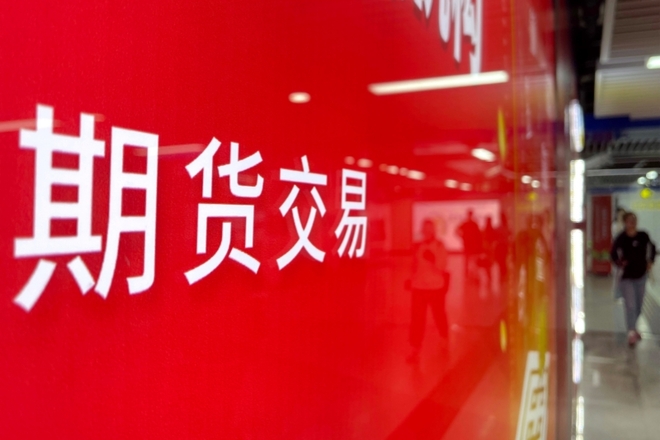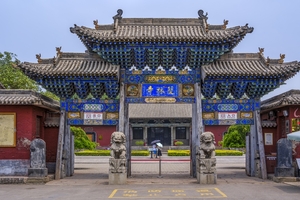Caixin Weekly | High-Frequency Trading Embraces Regulation (AI Translation)
Listen to the full version


文|财新周刊 岳跃
By Caixin Weekly's Yue Yue
文|财新周刊 岳跃
By Caixin Weekly's Yue Yue
“申报费一涨再涨、交易所返还取消、交易成本数倍增加,高频策略全部失效,好日子早就到头了。”一家外资高频交易商的内部人士近日对财新称,中国监管机构和交易所近年政策频出,剑指高频交易,“几斧头下来后,我们整个盘子现在降到了两三年前的十分之一,下一步可能要考虑裁员了”。
"Application fees have increased repeatedly, exchange rebates have been canceled, and trading costs have increased several times over. All high-frequency trading strategies have failed; the good days are long gone," an insider at a foreign high-frequency trading firm recently told Caixin. Chinese regulators and exchanges have introduced a series of policies in recent years targeting high-frequency trading. "After several blows, our entire portfolio has now shrunk to about one-tenth of what it was two or three years ago, and we might have to consider layoffs next," the insider said.
财新此前报道,中国期货市场潜伏着一股神秘的力量,它们大多低调地隐身于贸易公司背后,实际从事高度专业化的高频交易,成交巨量且获利颇丰。它们在海外,正是一个个名字响当当的高频交易巨头(参见本刊2022年第5期《中国期市“房间里的大象”》)。
Caixin previously reported that a mysterious force lurks in the Chinese futures market, often operating discreetly behind trading companies. In reality, they engage in highly specialized high-frequency trading, executing massive transactions and reaping considerable profits. Overseas, they are renowned high-frequency trading giants (see Issue 5 of Caixin Weekly, 2022, "The Elephant in the Room of China's Futures Market").

- DIGEST HUB
- Chinese regulators have introduced policies imposing higher application fees, canceling exchange rebates, and increasing high-frequency trading costs multiple times, which has drastically shrunk foreign trading portfolios and affected profitability.
- Efforts to regulate high-frequency trading in China include fee increases, trading volume limits, and increased monitoring, aimed at maintaining market order and protecting retail investors.
- Foreign high-frequency trading firms face challenges legitimizing themselves, with issues in obtaining private fund manager licenses and navigating compliance requirements, leading to potential market exits.
Chinese regulators and exchanges have been targeting high-frequency trading (HFT) with a series of policies, including increased trading fees, cancellation of rebates, and stricter monitoring, which have caused a significant decline in HFT activities and profitability within the Chinese market[para. 1]. Caixin previously highlighted how foreign high-frequency traders often operate covertly and profitably within China's futures market and the limited legal ways these institutions have to participate in the market[para. 2]. Most foreign high-frequency traders have resorted to registering local trading companies to benefit from national treatment, although this is seen as a regulatory loophole rather than a legitimate method[para. 3]. High-frequency trading has faced increasing scrutiny during market downturns, often blamed for exploiting retail investors[para. 4]. The Chinese Securities Regulatory Commission (CSRC) has emphasized the need to strengthen the monitoring and regulation of HFT to protect small and medium investors, and to improve market stability and development[para. 5],[para. 6].
The Shanghai, Shenzhen, and Beijing Stock Exchanges have completed consultations on regulations specific to program trading, including criteria to identify high-frequency trading, significantly impacting the sustainability of high-frequency trading strategies[para. 7]. Some foreign high-frequency traders have attempted to legitimize their operations by acquiring private fund manager licenses from the Asset Management Association of China (AMAC), but have faced significant practical challenges resulting in many withdrawing their applications[para. 8],[para. 9]. The insider reports that trading fees have almost doubled for high-frequency traders due to the lack of fee rebates, severely impacting their profitability and leading to consideration of alternative markets like India[para. 10],[para. 11].
The recent increase in fees and earlier policies targeting declaration fees and trading limits have led to a significant drop in the volume of high-frequency transactions by 70% to 80%, making professional high-frequency strategies less advantageous[para. 12],[para. 13]. This has affected the overall operational performance of futures companies, leading to a significant decline in operating revenue and net profit for the industry[para. 14]. Despite significant challenges, some believe the Chinese market still possesses resilience and room for regulatory adjustments. However, compliance with specific methods and approaches remains an area needing greater precision[para. 15],[para. 16].
High-frequency traders in China have faced additional barriers due to compliance and public opinion, contemplating private fund manager licenses as a workaround. However, procedural complexities and failures to conform to regulatory requirements have plagued their attempts, leading to the termination and withdrawal of applications[para. 17],[para. 18]. Proprietary trading and asset management are distinct industries, and some believe that transforming into asset managers may not suit high-frequency traders due to the fundamental differences in operational models[para. 22],[para. 23].
There has been significant discourse around whether HFT disrupts market fairness, increases volatility, or provides predatory liquidity. While some see HFT as providing necessary liquidity and price discovery, others contend that it provides false liquidity and harms retail investors[para. 33]. There is a consensus that HFT does not instigate market volatility but rather absorbs volatility to some extent. Known for stable performance in proprietary trading but experiencing volatility in asset management, the capabilities of HFT firms in asset management are viewed with skepticism[para. 25],[para. 26],[para. 27]. Consequently, regulators have remained cautious, requiring HFT firms to substantiate their genuine intent and capability in managing assets[para. 30],[para. 31].
Globally, regulations for high-frequency trading have evolved, with jurisdictions like Europe, the US, and Japan imposing specific licensing and operational requirements. Japan, in particular, has made significant strides by obligating HFT firms to register and maintain rigorous internal controls, which can offer regulatory insights for China as these models emphasize market integrity while leveraging technological advancements in trading[para. 41],[para. 43],[para. 44],[para. 45],[para. 46]. Japanese regulators emphasize monitoring and the transparency of trading activities while allowing the market to function relatively freely, suggesting a regulatory balance that China's regulatory bodies may consider adopting[para. 47],[para. 48],[para. 49].■
- Industrial Securities
- The article mentions 徐一洲, an analyst from Industrial Securities, who states that the recent regulatory measures targeting high-frequency trading might decrease short-term market activity but will benefit the long-term industry structure and stability by weeding out firms overly reliant on high-frequency trading and favoring top firms with more diverse revenue streams.
- Optiver Private Fund Management (Shanghai) Co., Ltd.
- Optiver Private Fund Management (Shanghai) Co., Ltd., a high-frequency trading firm originating from the Netherlands, registered with the China Securities Investment Fund Association in September 2021. However, it was deregistered in March 2023 due to failing to file its first private fund product within 12 months of registration. Optiver's entity in China, Optiver (Shanghai) Trading Ltd., was heavily involved in China's futures market.
- Optiver (Shanghai) Trading Co., Ltd.
- Optiver (Shanghai) Trading Co., Ltd., established in October 2012, is a high-frequency trading entity in China connected to the global trading firm Optiver, headquartered in the Netherlands. It has engaged in significant trading activities in the Chinese futures market and was involved in applying for a private fund manager license under the name Optiver Private Fund Management (Shanghai) Co., Ltd, which was later revoked.
- Jump Trading Private Fund Management (Shanghai) Co., Ltd.
- Jump Trading Private Fund Management (Shanghai) Co., Ltd. had applied for private fund manager registration with the Asset Management Association of China. However, their application was terminated after the only registered foreign high-frequency trading firm's fund manager license was revoked. This highlighted the difficulty for high-frequency trading firms in transitioning to regulated fund management in China.
- Hudson River Trading Private Fund Management (Hangzhou) Co., Ltd.
- Hudson River Trading Private Fund Management (Hangzhou) Co., Ltd. had applied for private fund manager registration with the Asset Management Association of China. However, after receiving feedback indicating that required materials were incomplete, the application process was terminated. The company officially deregistered from commercial operations by the end of 2023.
- Jump Trading Industry (Shanghai) Co., Ltd.
- Jump Trading Industry (Shanghai) Co., Ltd., part of global high-frequency trading giant Jump Trading, operates in China as a trade company primarily engaged in substantial financial market transactions. Despite ostensibly conducting some physical commodity trade, its primary business remains high-frequency trading. The company has faced scrutiny for its practice of transferring significant investment returns to overseas affiliates through management fees and special licensing rights.
- Issue 5 of Caixin Weekly, 2022:
- Caixin reported on the presence of a mysterious force in the Chinese futures market engaged in high-frequency trading.
- August 2022:
- Exchanges introduced measures to charge declaration fees for information volumes exceeding certain standards in some futures and options contracts.
- March 28, 2023:
- Odin Capital Fund's private fund manager qualification was revoked.
- End of 2023:
- Hangzhou DunYue Private Fund Management Co., Ltd. deregistered its business.
- November 2023:
- Several exchanges imposed trading limits on the most actively traded and highest volume commodities.
- By January 2024:
- Futures companies applied for new fee reduction plans to exchanges, excluding specific programmatic reporting clients recognized by exchanges.
- January 2024:
- The first set of industry data following the implementation of the exchange fee reduction scheme was released showing significant drops in revenue and profit for futures companies.
- After January 2024:
- The Futures Industry Association stopped publicly disclosing commission revenue data for the industry.
- April 2024:
- CSRC Director Zhang Wangjun stated that high-frequency trading should be regulated to maximize benefits and minimize harms.
- PODCAST
- MOST POPULAR





 Sign in with Google
Sign in with Google
 Sign in with Facebook
Sign in with Facebook
 Sign in with 财新
Sign in with 财新